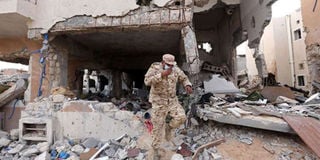Could Africa be next safe haven for Islamic State terrorists fleeing Middle East?

A member of the Libyan forces of the National Accord patrols Sirte's Al-Giza Al-Bahriya district on December 20, 2016 after they had driven out the Islamic State group out of its Libyan stronghold earlier during the month. PHOTO | MAHMUD TURKIA | AFP
What you need to know:
Most African Union (AU) members were represented at the conference where Algerian AU Peace and Security commissioner Smail Chergui warned that “2,000 to 2,500 Isis terrorists were regrouping with a view to relocating to the troubled regions in the Sahel, the Horn of Africa and Great Lakes”.
Boko Haram, still active in northern Nigeria, also posed another major security challenge in the surrounding region.
Could Africa be the next safe haven for the Islamic State in Syria (Isis) terrorists fleeing the Middle East?
The concern emerged at the 10th session of the African Centre for Research and Study on Terrorism in Algeria on December 14.
Most African Union (AU) members were represented at the conference where Algerian AU Peace and Security commissioner Smail Chergui warned that “2,000 to 2,500 Isis terrorists were regrouping with a view to relocating to the troubled regions in the Sahel, the Horn of Africa and Great Lakes”.
“Tunisian borders were also a source of worry following the terrorists’ defeat in the Libyan city of Sirte,” he said.
Boko Haram, still active in northern Nigeria, also posed another major security challenge in the surrounding region.
Mr Chergui said some Isis elements were of African origin, hence the vulnerability of the continent. “They were already present in Yemen and Somalia,” he said.
“Our priority is to be able to gather information and intelligence about them, share with our partners, then develop concrete regional and international cooperation to curb the imminent danger,” he advised.
Mr Chergui said during his recent visit to Russia and Iran, both countries expressed support for counter-terrorism cooperation with the AU.
IN COLLABORATION
He further explained that an AU force was in Somalia and another would be deployed in collaboration with the UN in north Mali to secure an agreement signed by different Malian factions but very often subject to violations by the groups.
However, he expressed fears that with the presence of terrorists in impoverished parts of the continent, it remained easier for them to radicalise youth and convince them to join up.
The new Ghanaian director of the Algiers-based terrorism research centre, Mr Larry Gbavlo Lartey, said “the dangerous impact of terrorism and its trans-national character compelled us to strengthen our cooperation by taking practical actions to curb sources of violence and extremism”.
The use of technology to spread terror was also discussed at the Algiers meeting.
Algerian Religious Affairs Minister Mohamed Aissa said ICT was the easiest and most readily available tool for Isis recruitment and spreading its propaganda.
The minister said a handful of young Algerians had joined Isis compared to neighbouring countries, whose combined numbers represented over 20 per cent Isis troops.
The African Centre for Research and Study on Terrorism was established in 2004 in Algiers.
It is an AU institution that offers assistance to member states in developing strategies to prevent and combat terrorism.




